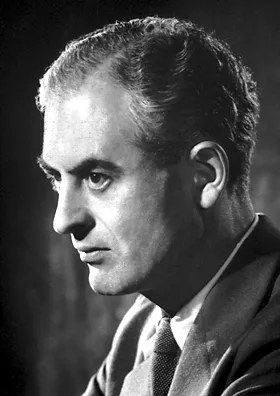
Full Name: Peter Medawar
Birth Year: 1915
Death Year: 1987
Nationality: Brazilian-English
Field of Study: Biology and Immunology
Notable Achievement: Nobel Prize laureate
1915 – Peter Medawar, Brazilian-English biologist and immunologist, Nobel Prize laureate (d. 1987)
Peter Medawar, born in 1915, emerged into a world teetering on the brink of monumental change. This was a time when science was wrestling with the mysteries of life itself, and Medawar would soon become one of its foremost explorers. Raised in a multicultural environment, his Brazilian-English heritage shaped his worldview and instilled in him an insatiable curiosity about the natural world.
As he navigated through his formative years, he found himself gravitating toward science like a moth to a flame. It was during his undergraduate studies at Magdalen College, Oxford that he began to carve out his niche in biology however, it wasn’t an easy journey. Despite being initially more interested in literature than sciences during his early education, the allure of understanding life at its most fundamental level became irresistible.
The Second World War threw numerous obstacles into many lives; for Medawar, it interrupted what could have been a straightforward academic ascent. However, ironically enough, this conflict would inadvertently catalyze significant developments in medical science. He served as an officer during the war and gained invaluable insights into immunology while observing various diseases affecting soldiers insights that would later form the cornerstone of his pioneering work.
After the war ended, Medawar returned to academia with renewed vigor and ambition. It’s remarkable how often critical turning points resemble detours; who knows how different things might have been had he not enlisted? His post-war research focused on organ transplantation and immunology a field riddled with challenges due to the body’s inherent tendency to reject foreign tissues.
Medawar's path towards fame accelerated dramatically when he introduced groundbreaking theories about immune tolerance the idea that certain tissues could be accepted by the immune system if they were introduced early enough. Perhaps one could argue that this discovery was not just scientific but deeply philosophical: it suggested harmony amidst conflict within biological systems. In 1960, this work garnered him international recognition as he was awarded the Nobel Prize in Physiology or Medicine alongside Sir Frank Macfarlane Burnet for their contributions to understanding immune response mechanisms.
The accolade didn't merely signal triumph; it also ushered him into new realms of influence within scientific circles and beyond! Media outlets clamored for interviews as they spotlighted not just Medawar’s findings but also his charismatic personality which drew comparisons to literary figures rather than typical scientists.
His style resonated far outside laboratory walls; people adored hearing him speak passionately about complex subjects using vivid metaphors a far cry from dry academic jargon! He described biological phenomena as 'the intricate dance of molecules,' transforming dense material into accessible stories that sparked curiosity among non-scientists too!
However like any brilliant mind Medawar faced criticism along his journey. Some contemporaries derided him for being overly speculative or dismissive toward unorthodox ideas within immunology itself yet despite this backlash against innovation versus tradition debate raging around him...he continued forging ahead undeterred! Perhaps what made Peter so compelling wasn't solely intellect but also resilience the ability to remain focused amidst discordant opinions.
A key element fueling such determination stemmed from realizing science requires collaboration across disciplines rather than isolationism which can stifle creativity! This perspective echoed throughout much of Medawar's career as he advocated interdisciplinary dialogue by establishing research groups that transcended traditional barriers among scientists specializing across varied fields from biochemistry through genetics to explore opportunities previously overlooked!
In time though... success brought forth additional responsibilities alongside public attention as is often true for notable figures striving towards excellence while maintaining authenticity amid scrutiny swirling around them constantly! After all…many fans wanted more than breakthroughs they yearned insight regarding emotional landscape underlying those pursuits motivating passionate individuals dedicatedly pursuing knowledge relentlessly!
This quest culminated later on into writing several books encompassing both popular science themes alongside reflections concerning ethics governing progressions witnessed throughout medicine’s evolution over decades past including issues surrounding biotechnology advancements shaping future trajectories globally today!
He didn’t shy away from broaching controversial topics either for instance tackling debates surrounding genetic engineering practices openly questioning ethical ramifications entailed therein whilst advocating cautiously assessing potential consequences arising impacting society altogether...
A significant period worth noting arrived post-Nobel era it seems paradoxical yet invigorating how moments initially perceived solely centered around accolades morphed eventually metamorphosed towards fostering communal explorations sharing wisdom gleaned over lifetimes dedicated working tirelessly unraveling enigmatic phenomena governing existence surrounding us all!
Cumulatively reflecting upon legacy…it becomes apparent just how intertwined scientific achievements intertwine harmoniously woven narratives echoing truths reverberating timelessly across generations influencing ongoing dialogues shaping contemporary frameworks guiding aspiring researchers aiming boldly advance frontiers forever extending horizons illuminating paths previously uncharted...
Even today...
Early Life and Education
Medawar spent his early years in Brazil before moving to England, where he pursued his education. He initially studied zoology at the University of Oxford, where he earned his Bachelor of Arts degree in 1938. His academic career was temporarily interrupted by World War II, during which he served in the British Army as a research scientist. This experience further ignited his passion for biological research.
Major Contributions to Science
Medawar's most notable work came in the field of immunology, particularly regarding the body's acceptance or rejection of transplanted organs. He discovered the concept of 'acquired immunological tolerance,' which describes how some transplanted tissues are accepted by the recipient’s immune system. His findings led to a better understanding of how to prevent organ rejection, improving the success rates of transplants.
In recognition of his groundbreaking research, Peter Medawar was awarded the Nobel Prize in Physiology or Medicine in 1960, alongside colleagues Sir Frank Macfarlane Burnet and Jacques Monod. Their collective work provided immense insight into the interaction between the immune system and organ transplants, making vital contributions to medical procedures that are commonplace today.


